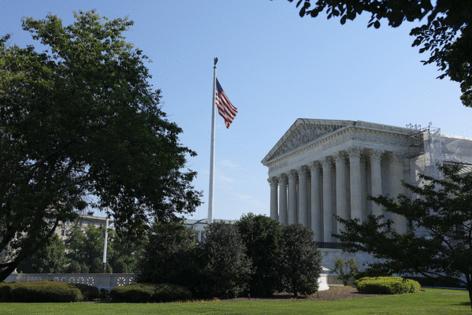Commentary: Supreme Court strikes against democracy, again and again
Published in Political News
This Supreme Court term has not been good for democracy, to put it mildly.
Despite a few bright spots — like the decision overturning a lower court injunction barring the White House from communicating with social media companies about disinformation — voting rights and efforts to curb big money and dark money in politics have been drastically pared back.
The court removed the power of experts in administrative agencies like the Environmental Protection Agency or Food and Drug Administration to regulate and keep us safe and placed it in the courts. The court also undercut attempts to hold the perpetrators of the Jan. 6 insurrection, including former president Donald Trump, accountable.
Justices Clarence Thomas and Samuel Alito remain embroiled in a series of ethics scandals related to luxury travel and expensive gifts from major Republican donors that they did not reveal in their financial disclosures. Those scandals have drawn public ire and attention to the fact that Supreme Court justices are the only federal judges not subject to a binding code of ethics.
The court’s ruling in United States v. Trump held that presidents are absolutely immune from criminal prosecution for acts under their constitutional duties and presumptively immune to all official acts. In practice, the timing of this decision, months after oral argument, makes it highly unlikely that the former president will face a trial on conspiracy charges before voters go to the polls in November.
In contrast, the court took just 25 days to issue an opinion after oral arguments in Trump v. Anderson, restoring Trump to the Colorado primary ballot by ruling that states could not determine eligibility for federal office, including the presidency, under Section 3 of the 14th Amendment. While the case’s outcome meant the former president was not held accountable, the quick timing of the decision gave state elections officials and voters clarity.
In a third case this term related to the Jan. 6 insurrection, Fischer v. United States, the Supreme Court ruled that federal prosecutors improperly used an obstruction law to prosecute some of those who stormed the Capitol. The ruling is expected to affect hundreds of cases.
In each of the three cases, Justices Thomas and Alito ignored calls to recuse because their wives’ actions raised concerns about their own impartiality.
Experts in legal ethics said Ginny Thomas’ texts to White House Chief of Staff Mark Meadows about the election being stolen and Martha-Ann Alito flying flags used by the “stop the steal” movement outside their homes raised serious questions about the justices’ impartiality.
The Supreme Court dealt another serious blow to voting rights this term. Following the decision that federal courts could not intervene to stop partisan gerrymanders (Rucho v. Common Cause), the court eclipsed that disastrous ruling in Alexander v. South Carolina Conference of the NAACP. The majority ruled that even though South Carolina’s congressional maps discriminated against Black voters, that was acceptable because those voters were targeted because the majority of them were Democrats.
...continued
©2024 Tribune Content Agency, LLC.







Comments